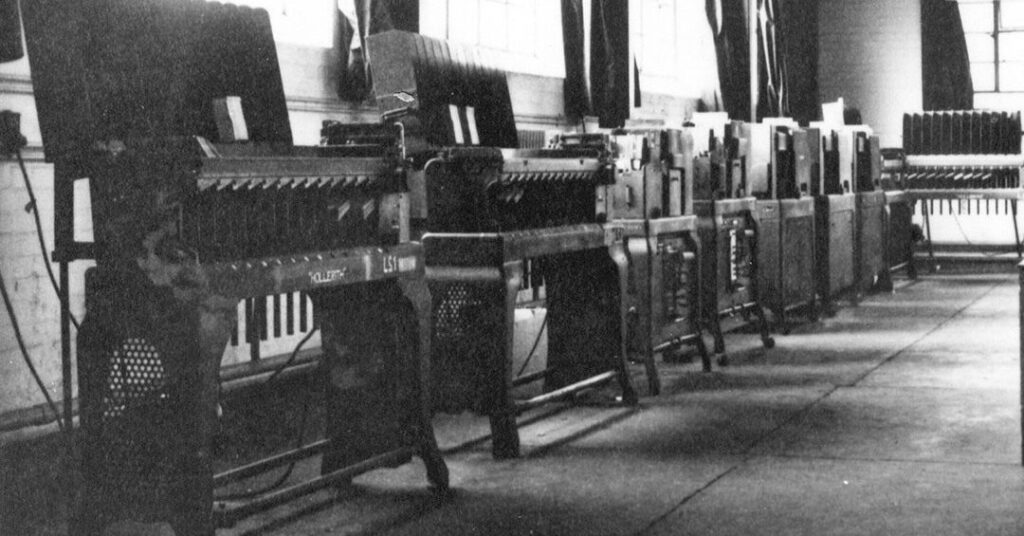In fact, according to the official internal history of Hut 6, the introduction of two mechanical additions to the Enigma – the ‘Uhr’ plugboard adapter and the field-rewireable reflector ‘D’ – had created a great deal of extra work for the team. So, despite the nearness of victory on the battlefield, success in codebreaking had become increasingly difficult.
The sound of silence
For some staff, things immediately stopped on 8 May. “I was actually on an evening or night shift when the German war ended, because suddenly the machines were all switched off,” recalled Wren Colossus Operator, Diana Anderson. “It was very cold because the machines had kept the room warm, and I remember climbing up on the table and trying to sleep there. We couldn’t go home, as transport would only be coming for us when the shift ended.”
Like so many at Bletchley Park, Diana’s immediate reaction was relief, followed by the desire to finally get some sleep. Her colleague, Wren Rachel Kimber, shared the same sentiment: “We were on watch, and somebody came in and said, ‘The war has ended, the war has ended!’. I can’t remember if it was in the morning or afternoon, but I remember at some point going to sleep on the hard stone of the cloakroom floor, even though I was on duty,” she said. “The war ended, and I had to have a sleep, so the cloakroom floor had to do.”
A day of celebration
Other staff were able to join the celebrations in London, including Audrey Vine, a Wren in the Naval Section. “We went down to London and came back in the evening,” she recalled. “Everybody talked to everybody, no matter who you were, because we’d been under such a cloud for such a long time. The elation was tremendous – it really was a very exciting day.”
Meanwhile, some staff were able to celebrate at Bletchley Park itself. One veteran (who shall remain nameless) remembered tracking down some beer and getting so drunk that he ended up falling into the lake!
A moment of reflection
However, it should also be noted that for many of the staff at Bletchley Park, the end of the war in Europe did not mean the end of their work. While most people associate Bletchley Park with breaking German ciphers, the codebreakers were also working tirelessly on Japanese ciphers. Alongside their American counterparts, they were heavily involved in deciphering Japanese naval and military codes, as well as diplomatic traffic. Preparations were also underway for the land invasion of Japan – a vast amphibious operation that would dwarf D-Day in both scale and likely casualties, which might have stretched the war into 1946.
The abrupt end of the Japanese war in August, after the dropping of the atomic bombs, came as a complete surprise to most. The Manhattan Project and the bombs’ development remained a closely guarded secret – even at Bletchley Park, where secrecy was part of the daily routine.
So, for the team operating the Hollerith punch-card machines in block C, VE Day meant only a brief moment of celebration before their Japanese work resumed. “On VE Day, our little boss, Mr Freddie Freeborn, came out so excited and said, ‘It’s just been announced, the war has ended in Europe’,” said Civilian Operator, Peggy Munn. “Of course, all our punch cards went up in the air, and we all danced around – it was lovely. After a while, he and the supervisor said, ‘That’s enough, tidy up’. We were then told to go home but to be back on Monday, as we still had the Far Eastern War to clean up and we would have to do the same thing with different codes.”
Into the unknown
Bletchley Park had grown from a few hundred to nearly 9,000 members of staff since 1939, and it was clear that not all of them would be needed once the war ended. For many, the threat of redundancy and the question of ‘What next?’ were on their minds. “Of course, we were delighted, but nobody knew what they were going to do,” recalled Edith Davidson, a civilian in the Air Section. “It was a difficult time, because most people had no jobs to go to. They really didn’t know what the future held.”
Some returned to academia, but for many, especially women, finding work with similar responsibilities was hard. Another burden was secrecy, as it was declared that the work at Bletchley Park would remain classified indefinitely, and staff were expected to take their secrets to the grave. “I must admit that I was quite bitter at the end of the war, when others got marches and the like, we got nothing,” said Doreen Tabor of Hut 3. “I just walked out with no recognition – nobody thanked us, we were no longer needed, so we were just allowed to just drift away.”
But these restrictions have since been lifted and veterans can share their stories, shedding light on the remarkable work that took place at Bletchley Park, and revealing their significant contributions throughout the war and to victory in 1945.
Learn more about Bletchley Park
Bletchley Park is now a museum and heritage attraction, open daily to visitors. If you’d like to discover more about the incredible achievements of the people who worked there during World War II, why not visit yourself?
Find out more about Bletchley Park and plan your visit now.
Book your tickets
Premium IPTV Experience with line4k
Experience the ultimate entertainment with our premium IPTV service. Watch your favorite channels, movies, and sports events in stunning 4K quality. Enjoy seamless streaming with zero buffering and access to over 10,000+ channels worldwide.

















